-
How many bank holidays does France get vs Europe and US?
See how France compares as MPs debate taking away one of the country’s jours fériés
-
SNCF train tickets open for early 2025 bookings
International destinations and skiing stations within France are included in the seats now available
-
Is tourist tax collected when staying in a French Airbnb?
Hotels add taxe de séjour to the bill
La Fête Nationale: 14 facts about France's national holiday July 14
The July 14 'Bastille Day' celebration features a military parade in Paris and means a day off work - although in 2024 it falls on a Sunday

France's national day (July 14) is usually a bank holiday, however in 2024 it falls on a Sunday.
French bank holidays do not roll-over onto the next working day, so it unfortunately means people will not get a day off work.
However, you can hopefully entertain your French friends and put a smile on their faces by bringing up these 14 facts about the famous day
1. It is not actually called 'Bastille Day' in France
Although it is known as Bastille Day in English-speaking countries, in France it is formally known as La Fête Nationale, and commonly le quatorze juillet.
2. The first celebration was called the Fête de la Fédération
It took place on July 14, 1790. However, the first official Fête Nationale did not happen until July 14, 1880.
3. It commemorates the beginning of the French Revolution in 1789
On this day, more than 200 years ago, revolutionaries stormed the notorious Bastille prison, which had become a symbol of royal oppression in Paris.
4. The Bastille was originally a fortress
It was built around 1370 to defend Paris from the English in the 100 Years War. It later became a prison and housed many political prisoners.
5. La Fête Nationale could have been on August 4
August 4 was also considered as a possible date for the Fête Nationale, as it marked the end of the feudal system in France in 1789.
6. Local prefects are encouraged to party hard
The date of the Fête Nationale was written into law on July 6, 1880, and the Interior Ministry recommended to prefects that the day should be "celebrated with all the brilliance that the local resources allow".
7. The July 14 military parade is the oldest in Europe
The military parade along Paris’s Champs-Elysées on July 14 is the oldest and grandest regular military parade in Europe. It was first held on July 14, 1880.
However, in 2024 the parade will happen on Avenue Foch due to the preparations for the Paris Olympic Games (starting July 26).
Read more: Are tickets for Paris Olympics or Paralympics still available?
8. There were just a few prisoners in the Bastille when it was stormed
When it was stormed, the Bastille was found to house only seven prisoners - four forgers, two “lunatics” and one “deviant” aristocrat, the Comte de Solages. The notorious Marquis de Sade had been transferred out of the prison 10 days earlier.
9. Louis XVI only found out about it the next day
The king, Louis XVI, was not informed of the attack on the Bastille until the following day. He reportedly asked if it marked the start of a revolt - only to be told: “No sire, it is a revolution.”
10. The original stone foundations of the Bastille are now in central Paris
Much of the Bastille was destroyed by November 1789. Today, only a few stone foundations remain - and they have been relocated to the side of the Boulevard Henri IV in Paris.
11. The original key to the Bastille is in America
Unlike the prison, the key to the Bastille still exists. It can be found in George Washington's residence of Mount Vernon. It was sent to him by the Marquis de la Fayette in 1790 - who had been a key player in the American War of Independence.
12. Belgium also celebrate Bastille Day
Liege, in Belgium, has also marked Bastille Day since the end of the First World War. The city was awarded the Legion d’honneur in recognition of its resistance against advancing German forces in the Battle of Liege at the start of the conflict.
13. As does Sacramento in California
Sacramento, California, meanwhile, marks the day with a street festival featuring "waiter races" in the midtown restaurant and shopping district.
14. A million people once attended a Bastille Day concert in Paris
In 1979, one million people attended Jean-Michel Jarre’s Bastille Day concert at Place de la Concorde. At the time it was a world-record crowd for a concert.























